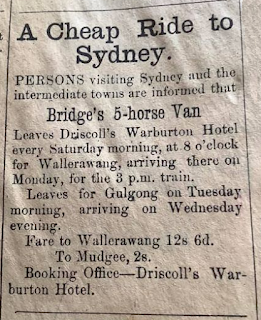NEWS ITEMS
1860 - Sudden Death, Under Suspicious Circumstances
Source: 1861 - ALLEGED MURDER OF AN ABORIGINAL
An inquest was held at Guntawang, on Monday, the 19th inst., on the body of Hugh Frazer, a hutkeeper in the employ of Mr. Rouse, before Dr. King, the Coroner, and a respectable jury. It appears from the evidence that the deceased was hutkeeping at a sheep station, about twelve, miles from Guntawang. On Friday, the 16th inst., the shepherd went out wilh his sheep as usual, and on his return found deceased lying dead under the berth. He went with his sheep to an adjoining station, put them in the yard and stopped all night. On the following morning he reported the death of Frazer, and proposed leaving his sheep in the yard while he went into Guntawang to reportthe circumstance. It was, however, arranged that he should mind the sheep about the hut, and look after the children while the shepherd's wife went in. Mr. Thacker, the overseer, came out, and upon examining the hut he found that it had been swept cleaner than usual.
He observed holes in the earth floor indicating recent traces of blood, as if one had been filled and flowed over to the other. This he pointed out to a constable who was with him. The shepherd stated that a tilted cart had stopped there the night before, and, that deceased while talking to the owner of the cart that morning suddenly complained of being ill and in pain, and had gone to the berth to lie down. He also stated that the hut had not been swept that day. It also came out in evidence that when an axe was enquired for to open a box, the shepherd stated, that he had put it away, but did not know where; this axe was found under the bed by the side of the dead body of deceased. The body was in a very advanced state of decomposition, and Dr. Cutting was unable to find any wounds sufficient to cause death or the loss of blood supposed by the appearance of the hole in the floor. The jury returned a verdict of "Died from natural causes".
An inquest was held on Wednesday, at the Plough Inn, Guntawang, before Mr W. King, M.D., coroner, on view of the body of John Dundar, an aboriginal, supposed to have been murdered by a man of the name of Thomas Black, who was in custody. Hugh Campbell, constable, belonging to the Mudgee police force, said, from information he had received he went to Guntawang on Monday and apprehended the person on suspicion of having murdered a blackfellow; he gave the usual caution, prisoner said that he knew nothing at all about it. Tommy Penny stated that a little before sundown they came up from the wash pen. Tommy was throwing sticks and tin kettles at one of the girls in the camp. As soon as he came up the prisoner and deceased began to fight on account of Johnny, saying "what you interfere with my little girl." Prisoner began to tear Jacky's shirt off, they fought two rounds, deceased was on the ground when his shirt was being torn. He (witness) hit prisoner, and asked him what he was fighting for, and took deceased on his lap, he did not speak, and died almost immediately; would swear that Johnny was thrown by the prisoner; Jacky had been at work all day; he was drunk, but was able to walk. Prisoner was neither sober nor drunk. The little girl was deceased's wife. He (witness) was sober, had had some three or four glasses of grog during the day, — Henry Gummer said he was taking his tea about sundown, when his little boy came in and said a blackfellow was beating a white man. Soon after, Tommy came and said, "Jacky is dead." He went with Mr Goldsmith to the camp, who told them not to bury the body. His hut was about sixty yards from the camp. He saw, as he was standing at his door, a man, but could not say it was prisoner. When he went with Mr Goldsmith, there was no one but the aborigines. White men frequently visited the blacks' camp—Mary Ann Gummer, wife of the previous witness, confirmed her husband s evidence, adding that she was almost certain that the prisoner was the man who was fighting the blackfellow, there were no other Europeans
near the place.—Arthur Thomas Piggott Cutting said he had viewed the body, and was of opinion that deceased came to his death by concussion of the brain, attended by extravasation of blood.—The jury returned a verdict that John Dundar came to his death by injuries received in a scuffle with prisoner, Thomas Black, at Guntawang, on the 26th November." Prisoner was then committed to Bathurst to take his trial for manslaughter.












